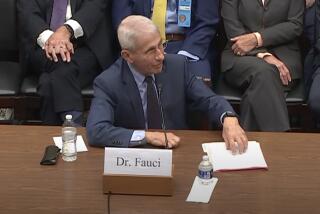Global Crossing Hearing Tackles Broader Issues
- Share via
WASHINGTON — Global Crossing Ltd. executives emerged relatively unscathed Thursday from their debut on Capitol Hill, where lawmakers are investigating the telecommunication firm’s bankruptcy.
Members of a House Financial Services subcommittee said Global Crossing’s demise, like that of energy giant Enron Corp., raised serious questions about aggressive accounting methods, inadequate disclosure to investors and excessive executive compensation.
“The failure of Global Crossing, Enron, etc., is a powerful reminder that this is not just about the foibles of one or two companies, but it’s about fundamental weaknesses that afflict our financial reporting system,” said Rep. John J. LaFalce (D-N.Y.).
But the first congressional hearing over Global Crossing was less pointed and confrontational than the often-hostile Enron proceedings, at which lawmakers launched blistering attacks and openly questioned the witnesses’ truthfulness.
With a few exceptions, committee members limited themselves to broader questions about accounting, corporate governance or disclosure issues at Global Crossing and industrywide.
Global Crossing Chief Executive John J. Legere and Chief Financial Officer Dan J. Cohrs were not pressed to defend or explain the details of specific deals under investigation. The executives dodged many questions by noting that an investigation into the company’s collapse is pending at the Securities and Exchange Commission.
Bermuda-based Global Crossing, which now operates primarily from Madison, N.J., filed for Chapter 11 bankruptcy protection Jan. 28 after spending $15 billion to create a worldwide fiber-optic network to carry telephone, broadcast and Internet services.
Legere characterized Global Crossing as the victim of an industrywide slump, caused by overcapacity and falling prices.
After the hearing, Legere said he was happy that committee members “were taking an approach looking at the business issues underlying the industry ... and what policy would be [enacted] to make changes.”
He and others at Global Crossing continue to reject comparisons to Enron. In his written testimony, Legere said flatly, “Global Crossing is no Enron.”
But a fired Global Crossing finance vice president, Roy Olofson, has accused Global Crossing of inflating its revenue by pursuing questionable swap deals with other telecommunications companies to buy and sell excess capacity on their networks. The SEC and FBI are investigating the charges.
“It appears that swaps are being used as a quick and easy way to inflate earnings and make a company look more profitable than it really is,” said Rep. Sue W. Kelly (R-N.Y.), who chairs the oversight subcommittee.
Rep. Richard H. Baker (R-La.) said it appeared that Global Crossing booked revenue in a current quarter to reflect the sale of broadband capacity for a portion of the network that was not yet constructed.
But such issues were not explored during the question-and-answer session, which focused instead on the loss of an estimated 9,000 jobs. Only three questions were asked about the allegations made by Olofson, who was unable to testify at Thursday’s hearing. And most lawmakers seemed to accept the explanations by Legere and Cohrs, who insisted that the swaps were fully disclosed to investors and approved by the company’s auditor, Andersen. The Chicago accounting firm also is under fire for reviewing Enron’s books.
Global Crossing executives stopped short of repudiating Olofson’s charges as they have in the past. Previously, company executives vehemently denied his accusations and characterized him as a disgruntled former employee attempting to blackmail the company with a lawsuit over his firing.
On Thursday, Legere said only that Global Crossing’s board was investigating Olofson’s charges.
“These forums, as difficult as they may be, are a very critical part of us moving through this restructuring process and clearing our name,” Legere said.
The most heated exchange of the morning hearing occurred when Rep. Stephanie Tubbs Jones (D-Ohio) took a slap at Legere’s multimillion-dollar salary package and contrasted it with the plight of laid-off Global Crossing workers whose severance payments were cut off by the bankruptcy filing.
After twice demanding that Legere publicly state his compensation--$1.1 million in salary and a $3.5-million bonus--Jones asked Legere to calculate how many laid-off workers could have been retained by using his bonus.
“As a rule, I don’t do math in public,” Legere responded.
“Would you pull out a calculator and do it for me, please?” Jones said. “I’m not looking for smart answers, sir. You’re here to help Congress come up with some decisions about how they handle this situation.”
Later, Legere said he didn’t take the exchange personally. “All the information about my salary is public knowledge ... and whether or not I’m worth my salary can’t be determined yet.”
Rep. Michael E. Capuano (D-Mass.) compared Global Crossing’s bookkeeping to “nothing more than a much more fancy and much larger Ponzi scheme.”
But he said he was refraining from quizzing executives about their actions.
“I don’t like the answers I’m getting,” he said. “I don’t think we’re going to get the answers. I don’t think this is the greatest forum. I think the SEC and the appropriate legal jurisdictions will be the ones who will ask tougher questions and will get the appropriate answers. And I will have to trust them at this point in time.”
Also testifying about their companies’ accounting methods and transactions with Global Crossing were Afshin Mohebbi, president of Qwest Communications International Inc.; Michael Salsbury, general counsel of WorldCom Inc.; and Andrew McGrath, president of service providers channel at Cable & Wireless Global.
*
Times staff writer Elizabeth Douglass contributed to this report.
More to Read
Inside the business of entertainment
The Wide Shot brings you news, analysis and insights on everything from streaming wars to production — and what it all means for the future.
You may occasionally receive promotional content from the Los Angeles Times.










